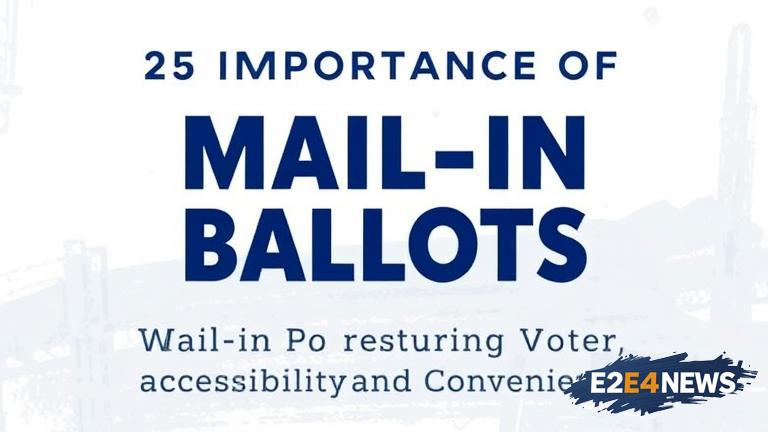The use of mail-in ballots has become a widely accepted practice in many countries, including the United States. This method of voting allows citizens to cast their ballots from the comfort of their own homes, eliminating the need to physically visit a polling station. One of the primary benefits of mail-in ballots is that they increase voter turnout, particularly among individuals who may face difficulties in accessing traditional polling stations. For instance, people with disabilities, elderly citizens, and those living in remote areas can greatly benefit from this system. Moreover, mail-in ballots provide voters with the opportunity to carefully review and consider their choices, reducing the likelihood of errors or misunderstandings. In addition, this method of voting can help to reduce congestion at polling stations, making the overall voting process more efficient. However, some critics argue that mail-in ballots are vulnerable to fraud and tampering, which can undermine the integrity of the electoral process. To address these concerns, many jurisdictions have implemented robust security measures, such as signature verification and tracking systems, to ensure the authenticity and accuracy of mail-in ballots. Despite these efforts, some states have introduced restrictions on mail-in voting, citing concerns about voter fraud and election security. These restrictions have been met with opposition from voting rights advocates, who argue that they disproportionately affect marginalized communities and undermine the fundamental right to vote. In recent years, there has been a significant increase in the use of mail-in ballots, particularly during the COVID-19 pandemic, when many states expanded their mail-in voting systems to reduce the risk of transmission. This shift has been driven in part by advances in technology, which have made it possible to securely and efficiently process mail-in ballots. Furthermore, many voters have come to appreciate the convenience and flexibility of mail-in voting, which allows them to cast their ballots at a time and place of their choosing. As the use of mail-in ballots continues to grow, it is essential to ensure that these systems are secure, accessible, and equitable. This can be achieved through the implementation of robust security measures, voter education campaigns, and efforts to expand access to mail-in voting. Ultimately, the goal of any voting system should be to ensure that all eligible citizens have the opportunity to participate in the democratic process, and mail-in ballots can play a critical role in achieving this objective. By providing voters with a convenient and accessible way to cast their ballots, mail-in voting can help to increase voter turnout, reduce congestion at polling stations, and promote a more inclusive and participatory democracy. In conclusion, mail-in ballots are a vital component of modern voting systems, offering a range of benefits and advantages that can help to promote voter accessibility and convenience. As such, it is essential to continue to support and expand mail-in voting systems, while also addressing concerns about security and integrity. By doing so, we can help to ensure that all citizens have the opportunity to participate in the democratic process, and that our elections are free, fair, and representative of the will of the people. The importance of mail-in ballots cannot be overstated, and it is crucial that we continue to prioritize their development and implementation. This will require ongoing efforts to improve security, expand access, and promote voter education, but the benefits of mail-in voting make it an essential aspect of modern democracy. In the end, the use of mail-in ballots has the potential to transform the way we vote, making it more convenient, accessible, and inclusive. As we move forward, it is essential that we continue to support and expand mail-in voting systems, and work to address the challenges and concerns that arise. By doing so, we can help to create a more vibrant and participatory democracy, where all citizens have the opportunity to make their voices heard.
